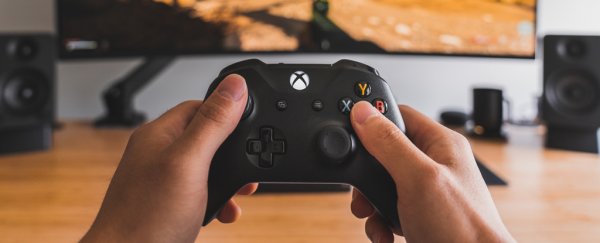As a hobby, video gaming can get some bad press when it comes to its effects on our physical and mental health – and it has been well established that sitting still all day isn't especially good for us.
However, done in moderation, there are upsides to video gaming.
A new study suggests that hours spent in front of a screen playing games each week can increase brain activity, and, in particular, boost the cognitive skills required for decision making – that is, taking everything coming through our senses and deciding on a suitable reaction.
The researchers behind the study suggest that video games could even be used as a training method to improve rapid-fire decision-making processes in the brain – perhaps if those brains have suffered some neural damage.
"Video games are played by the overwhelming majority of our youth more than three hours every week, but the beneficial effects on decision-making abilities and the brain are not exactly known," says neuroscientist Mukesh Dhamala from Georgia State University.
"Our work provides some answers on that."
Functional magnetic resonance imaging (fMRI) was used to measure neural activity in 47 college-age participants, made up of 28 people who regularly played video games and 19 people who didn't. Those who played predominantly engaged in highly active real-time games, such as real-time strategy, first-person shooters or team-styled 'arena' or 'royal' battles.
The volunteers were asked to press buttons in response to the direction that a series of dots were moving on a display in front of them. Regular video game players were both faster and more accurate in responding, and the resulting fMRI scans showed that there was also enhanced activity in certain parts of their brains.
Those areas included the right lingual gyrus, the left thalamus, and the right supplementary motor area – all regions of the brain thought to be involved in cognitive processing and producing motor responses to visual inputs.
"These results indicate that video game playing potentially enhances several of the subprocesses for sensation, perception and mapping to action to improve decision-making skills," Dhamala and his fellow researcher, physicist Tim Jordan from Georgia State University, wrote in their published paper.
Jordan has personal experience in the area: at age five, and with one eye weaker than the other, he took part in a study where he was asked to cover his good eye and play video games using only his weaker one, in order to strengthen its visual processing.
The training worked, and Jordan went from being legally blind in one eye to having the eyesight to cope with lacrosse and paintball.
The same sort of training could eventually be used to strengthen sensorimotor decision making too.
While the link between video gaming and cognitive boosts isn't new, with each piece of research we get closer to understanding it – and closer to figuring out how we might be able to utilize the positive impacts of video gaming.
"Video game playing can effectively be used for training – for example, decision-making efficiency training and therapeutic interventions – once the relevant brain networks are identified," says Dhamala.
The research has been published in Neuroimage: Reports.
